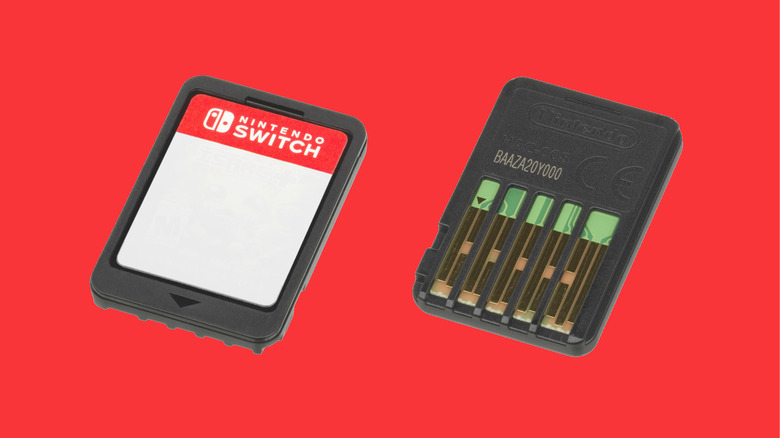Cartridges Are Keeping Nintendo Switch Games Pricey
It's a common occurrence for Nintendo Switch owners: a popular multi-platform game is getting a Switch port, and finally, you can experience it for yourself on Nintendo's innovative hybrid console. You can play it on your TV. You can play it on the bus. You imagine yourself gaming without barriers. "Hooray!", you say.
And then you see the price tag.
How can it be that a game — one that Xbox One and PlayStation 4 owners have been playing for years — is like $40 more expensive on the Nintendo Switch? And how is that true even if you're buying a digital version of the game on the Nintendo eShop? The answer has to do with Nintendo's choice to use a proprietary cartridge format — and also has to do with a related Nintendo eShop policy.
Compared to discs, Nintendo Switch cartridges are not easy to produce in mass quantities. On one hand, a Switch cartridge is flash storage, not unlike an SD card. On the other, Switch cartridges have a unique shape and size. Discs — whether they're CDs, DVDs, or Blu-Rays — pretty much take on the same form. The Nintendo Switch cartridge format, however, is a unique beast. If a Switch cartridge looked like an SD card, Nintendo could take advantage of the countless manufacturing facilities pumping those cards out. But it's not. So Nintendo must work with partners to create this very special type of flash storage card, and that makes the process more expensive.
It's the downside of choosing a proprietary storage format. And it's why you sometimes see new Switch games that cost $10+ more than their Xbox One and PlayStation 4 counterparts.
The cost of a Switch cartridge becomes an even bigger factor when you consider the size of different games. According to Eurogamer, Nintendo Switch cartridges come in 1 GB, 2 GB, 4 GB, 8 GB, 16 GB, and 32 GB flavors. The smaller-capacity cartridges don't cost as much as the larger ones, which works out for tinier games. Then again, those games are often indie titles that opt for an eShop-only release, negating the cartridge entirely.
So what of the eShop, then? Why is it that games releasing both physically and digitally on the Switch cost the same at GameStop as they do on the eShop? That's also on Nintendo, and the company's desire to keep game stores and big-box retailers competitive.
The same Eurogamer piece cited above mentions a policy that Nintendo has for any games that release on a Nintendo Switch cartridge and in the eShop, and that policy is this: the eShop version of the game can't be cheaper. Nintendo relies on the GameStops, the Amazons, and the Best Buys of the world to promote Nintendo Switch hardware and Nintendo Switch games. Physical copies of a game take up valuable shelf space at retailers, and the fact is, stores would be less inclined to afford Nintendo that space if players could simply jump on the eShop and get the same game at a better price.
As gaming goes more and more digital, this might not be a reality that a company like Nintendo has to face in the future. But for now, Nintendo has to keep its retail partners happy. Which means you don't save any money by cutting out the cartridge middleman.
We're nearly two years in to the Nintendo Switch's life and, unfortunately, it doesn't appear that the "Switch Tax" (as some call it) is going away anytime soon. There's no word that Nintendo has been able to drive down the cost of manufacturing Nintendo Switch cartridges, which would in turn allow Switch games to be priced more competitively. Meanwhile, games are only getting bigger. Nintendo has plans to introduce a 64 GB Nintendo Switch cartridge sometime this year, paving the way for bigger titles to show up on the platform. And that'll undoubtedly make those games even more expensive — whether you buy a physical copy or download one.
The Nintendo Switch is a delightful little machine, with more than enough Nintendo exclusives to justify a purchase at this point. But most multi-platform games are still cheaper — and in most cases, better looking — on other platforms. And it doesn't look like that fact is going to change anytime soon.

